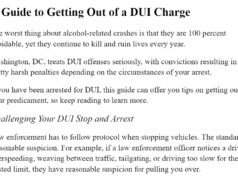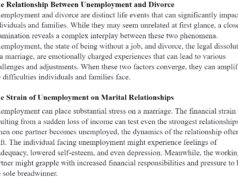SPONSORED CONTENT
Abandonment and Desertion in Divorce
Married couples sometimes can experience irreconcilable differences that force one of the partners to leave the family. Abandonment and desertion are used interchangeably and imply leaving a spouse without warning or communicating with them.
“Abandonment is a valid ground for the deserted party to file a divorce,” says attorney Matt Towson of Towson Law Firm. Before deciding on the action to take after being abandoned by a partner, it is ideal to contact a divorce attorney to understand the legal implications.
When Does Abandonment Occur?
Abandonment occurs when a married person neglects responsibilities and obligations to their partners or children. This neglect often results in one partner leaving home or the relationship without communicating with their partner about their whereabouts. Desertion happens very quickly and takes the other party unawares.
During a divorce proceeding, the partner who suffers from abandonment can use that as a legal ground for fault divorce. Additionally, some states can go the extra mile of charging the deserter with criminal abandonment where the couple had children.
How Abandonment and Separation Relate to a Divorce
The operational law in most states permits couples to file either a no-fault divorce or an at-fault divorce. However, in some states, couples seeking to terminate their marriage are only allowed to file a no-fault divorce.
When couples file an at-fault divorce, it shows that one of the parties blames the divorce on the other party’s misconduct. Where one of the parties abandons the other, it can be a basis for filing an at-fault divorce.
Are Abandonment and Desertion the Same Thing as Separation?
Abandonment and desertion are different from separation. The difference lies in the fact that while abandonment or desertion happens without the party notifying their partner, separation occurs due to a mutual agreement between both partners.
For instance, couples who find it challenging to resolve issues may decide to live apart for a while to figure out if they would want to continue or stay apart. However, when it comes to abandonment, a partner leaves the other without giving them prior notice of what they are planning. Although abandonment can be a ground for filing an at-fault divorce, where the couple is resident in a no-fault state, they cannot use it as a ground to file for divorce.
Exceptions in Abandonment
It is not in every situation where a marriage partner leaves the property that they will incur abandonment charges. The partner will have to go for nothing less than one year with no intention of returning within that period for the action to qualify as desertion. However, some exceptions exist where the party is not seen as a deserter even though they left for more than a year.
Circumstances abound where a divorce attorney can advise their client to leave the house pending the completion of a legal separation. Also, where a partner suffers domestic violence, neglect, and abuse in the hands of their spouse, a desertion charge will not be held against them if they decide to leave the house.
Where the partner’s life is being threatened, or they run the risk of being harmed if they stay back, it becomes ideal to leave even without communicating or getting their partner’s consent. However, before leaving the house on such grounds, it is essential to consult with an experienced divorce attorney who will provide advice from a legal viewpoint.
Abandonment and Child Custody
One of the things that a partner filing for abandonment has to think about is how it will impact child custody. A parent who files a divorce on the grounds of desertion and is able to pull through stands a better chance of getting custody of the child. The reason is that the court will view the parent who stayed back as responsible and not prone to violent behavior.
Once the amount of time that a partner can be away from home without incurring abandonment charges elapses, you should file child custody and also file for child support while at it. One thing to note is that spousal abandonment is not the same thing as child abandonment, although most times, they co-occur, which does not guarantee that the parent who left will not get custody of the child.
Common Misconceptions About Spousal Abandonment
Many complications arise from abandonment cases, and most of the complications are linked to misconceptions. Here are common misconceptions people have about spousal abandonment
#1. Abandonment Means the Same Thing as Separation
Spousal abandonment is not the same thing as separation. Agreeably, both spousal abandonment and separation result in a partner moving out of the shared home. However, if a partner leaves home but continues to honor their marital responsibilities, there is no abandonment case.
Additionally, it is not considered a desertion case if one leaves a shared home after a disagreement and returns days or weeks after. Spousal abandonment requires the partner to move out of the house without a prior agreement, usually one year or more.
#2. Relocating Without Reaching Mutual Agreement With a Partner is Abandonment
Where it becomes necessary for a couple to relocate because of work or other reasons and one of them decides not to go, the party who ends up relocating cannot be charged with abandonment as the case does not qualify as one.
#3. Abandonment Charge Means the Abandoner Will not Pay Child Support
Even when a marriage partner is charged with spousal abandonment, they will be required to meet their obligation towards the child if the marriage has any. The abandoned parent can file for custody of the children and the cancellation of the parental rights of the absentee parent. However, before this can become effective, there has to be undeniable proof that the absentee parent has been unable to fulfill their obligations towards their child.
Bottom Line
If you are seeking a divorce or your spouse is seeking to divorce you on the grounds of abandonment, you will have so many questions that you would need answers to. Knowing the right way to go about the case is vital as any wrong action can impact your case’s outcome. Therefore, it is essential to consult with a competent divorce lawyer who will point you in the right direction.

 Sign up for the Blue Virginia breaking news newsletter
Sign up for the Blue Virginia breaking news newsletter








